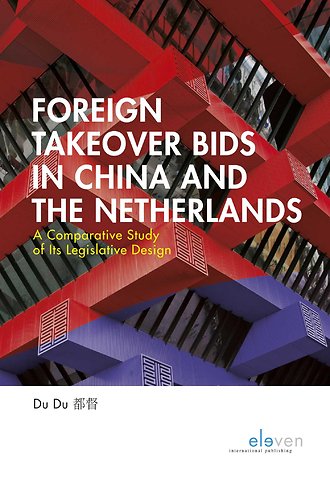


Du Du is currently working at an Asia-headquartered international law firm King & Wood Mallesons in Beijing, China.
Meer over Du DuForeign Takeover Bids in China and the Netherlands
A Comparative Study of its Legislative Design
E-book Pdf met watermerkbeveiliging Engels 2020 1e druk 9789059317895Samenvatting
Foreign takeovers have triggered increasing vigilance of host governments, as foreign ownership is likely to be deemed a potential threat to local employment, strategic assets, economic network, hightech competitiveness, and national security. Consequently, various countries have imposed different degrees of restriction on foreign investors.
The disparity that lies in the national rules regarding foreign takeovers implies that while companies in some countries are well shielded against foreign buyers, the policy toolkits available to protect local companies are likely to remain empty in other countries. Hence, recent years have witnessed an escalating increase in calls for a more reciprocal environment for crossborder takeovers.
Against this background, this book aims to investigate how national legislative designs react to the foreign takeoverrelated concerns in China and the Netherlands and accordingly propose several recommendations that may contribute to promoting a level playing field.
As a timely refection upon the increasingly protectionist national markets, this book will be interesting and inspiring for practitioners, academics, and policymakers in China, the EU and even beyond.
Trefwoorden
ondernemingsrecht internationaal recht overnames wetgeving china nederland rechtvergelijking buitenlandse investeringen nationale veiligheid protectionisme juridische vergelijking regelgeving economische politiek strategisch management cross-border transacties kapitaalmarkten marktbescherming bedrijfsovernames financieel management juridisch kader reciprociteit beleid fusies en overnames competitie strategische sectoren investeerdersrechten economie werkgelegenheid
Trefwoorden
Specificaties
Lezersrecensies
Inhoudsopgave
1 Background 2
2 Scope 6
2.1 Why foreign takeover bids? 6
2.2 Why state regulations of FDIs and corporate and securities laws? 7
2.2.1 State regulations of FDIs 7
2.2.2 Corporate and securities laws 9
2.3 Why China and the Netherlands? 10
3 Methodology 13
3.1 Doctrinal approach 13
3.2 Comparative approach 14
4 Scientific and societal relevance 16
5 Outline 17
II Theoretical Framework 21
1 Introduction 21
2 Why do takeovers occur: corporate law and economic perspectives 22
2.1 Defining the agency problem 22
2.2 Takeovers: driven by the agency problem 24
2.3 Takeovers: a potential antidote for the agency problem 27
3 The fear of foreign ownership 32
3.1 Effects on local employment 33
3.2 Effects on assets of strategic importance and domestic economic network 34
3.3 Effects on high-tech competitiveness 36
3.4 A remark: reflecting upon the fear of foreign ownership 37
4 The role of corporate and securities laws 38
4.1 Shareholders protection 38
4.2 Contestability determination 40
4.3 Power allocation 44
4.4 Interaction between corporate governance and foreign takeovers 47
5 The role of the state in regulating foreign takeovers 50
5.1 State regulations of FDIs 50
5.2 State intervention and protectionism 52
5.3 Keep the regulatory power of the state under control 56
6 Conclusion: building up the comparative framework 57
III Legislative Designs of Foreign Takeover Bids in China 61
1 Introduction 61
2 Regulatory framework of foreign takeover bids 64
2.1 Sources of law 64
2.2 Main regulatory authorities 70
3 The role of state regulation 71
3.1 Industrial policies and the sector-based review 71
3.1.1 An “industry catalogue plus strict approval” approach 71
3.1.2 Exploring and promoting a “negative list plus pre-establishment national treatment” approach 73
3.1.3 Implications of the deregulated approach 75
3.2 National security-based review 76
3.2.1 A gradually established national security review regime for foreign investments 76
3.2.2 The operation of the national security review 80
3.2.3 Reflecting upon the national security review regime 83
4 China’s stock market reforms 85
4.1 An increasingly unified stock market 85
4.1.1 The integration of A-shares and B-shares 85
4.1.2 The conversion from non-tradable shares to tradable shares 87
4.2 An increasingly open stock market for foreign investors 99
4.2.1 From establishing an enterprise to purchasing B-shares 99
4.2.2 From the B-share market to the A-share market 101
4.2.3 From a trivial stake to a controlling stake 105
4.3 Summary: preconditionsforthe emergence of foreign takeover bids are gradually met 114
5 The role of corporate and securities laws 115
5.1 Typologies of takeover bids 115
5.2 Procedure of takeover bids and corresponding requirements 116
5.2.1 Pre-tender phase 116
5.2.2 Tender phase 119
5.2.3 Post-tender phase 120
5.3 Takeover defences 121
5.3.1 Divisions of corporate power: who has the final say on taking defensive measures? 121
5.3.2 Defensive measures and their legality 123
6 Preliminary concluding remarks 139
6.1 Prominent role of the government in regulating foreign takeovers 139
6.2 But state regulations have been continuously simplified and streamlined 140
6.3 Limited role of corporate and securities laws in defending local companies 140
6.4 But corporate and securities laws are expected to do more 141
IV Legislative Designs of Foreign Takeover Bids in the Netherlands 143
1 Introduction 143
2 Regulatory framework of foreign takeover bids 144
2.1 Sources of law 144
2.2 Main regulatory authorities 149
3 The role of corporate and securities laws 150
3.1 Takeover Bids Directive 2004/25/EC 150
3.1.1 Aims of the Takeover Bids Directive 150
3.1.2 Pillars of the Takeover Bids Directive 152
3.1.3 A critical reflection: has the Takeover Bids Directive achieved its goals? 158
3.1.4 Summary 168
3.2 Typologies of takeover bids 169
3.3 Procedure of takeover bids and corresponding requirements 171
3.3.1 Pre-tender phase 171
3.3.2 Tender phase 176
3.3.3 Post-tender phase 178
3.4 Takeover defences 180
3.4.1 An overview 180
3.4.2 Preference shares 183
3.4.3 Depository receipts 187
3.4.4 Priority shares 189
3.4.5 Structure regime 190
3.5 Governing takeover defences 192
3.5.1 Enterprise Chamber and the inquiry proceeding 192
3.5.2 Standards set by case law 198
4 Emerging protective measures for Dutch companies 228
4.1 Newly established EU-wide screening framework of inward FDIs 228
4.1.1 Motivation of EU’s initiative for a common screening framework 228
4.1.2 Major features of the EU FDI screening framework 236
4.2 Emerging measures to restrict foreign takeovers in the Netherlands 238
4.2.1 Sector-based approach 240
4.2.2 Strengthened defensive arrangements in corporate law 241
5 Preliminary concluding remarks 246
5.1 Prominent role of corporate law in governing foreign takeover bids 246
5.2 Strengthened corporate law instruments for better protection of Dutch companies 247
5.3 The Dutch government is expected to play a role to ward off unwanted buyers 248
V Comparative Observations, Conclusion, and Recommendations 249
1 Introduction 249
2 Comparative Observations 249
2.1 Divergent regulatory approaches: corporate autonomy model vs. state dominance model 249
2.1.1 Corporate lawremainsthe predominant instrument to protect domestic companies in the Netherlands 249
2.1.2 China mainly relies on state regulations to filter out unwanted foreign takeovers 259
2.2 Gradually aligned practice in China and the Netherlands 264
2.2.1 China deregulatesthe regulation of foreign investment,while the Dutch government is ready to step in 264
2.2.2 Rules directing the bidding process are to a large extentsimilarin China and the Netherlands 265
2.2.3 Corporate and securities laws are expected to play a more significant role in regulating foreign takeovers in both jurisdictions 272
3 Conclusion 273
4 Recommendations 276
4.1 Joint effortsshould be made to furtherrefine the assessment framework
of the deployment of takeover defences in China 280
4.2 China should gradually enhance the flexibility of its corporate law 283
4.3 Established principles to constrain the use of takeover defences should be consistently carried out in the Netherlands 286
4.4 Governments can do more to make regulations concerning foreign takeovers easier for foreign investors to access in both jurisdictions 290
4.5 Security-related termsshould be narrowly defined, and remedieswithin the screening mechanism should be guaranteed in both jurisdictions 291
4.6 International dialogue and cooperation should be encouraged 292
A Final Concluding Remark 293
References 297
Anderen die dit e-book kochten, kochten ook
Rubrieken
- advisering
- algemeen management
- coaching en trainen
- communicatie en media
- economie
- financieel management
- inkoop en logistiek
- internet en social media
- it-management / ict
- juridisch
- leiderschap
- marketing
- mens en maatschappij
- non-profit
- ondernemen
- organisatiekunde
- personal finance
- personeelsmanagement
- persoonlijke effectiviteit
- projectmanagement
- psychologie
- reclame en verkoop
- strategisch management
- verandermanagement
- werk en loopbaan





